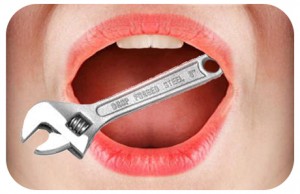 Last week, a patient, Ted, came in saying he had been experiencing a funny, metallic taste in his mouth for a while and was worried that it may be serious. I explained to him that there were a number of possible reasons for him having this taste in his mouth but we’d do a complete exam and see what we come up with. If you experience a metallic taste in your mouth, you’ll want to know what I told Ted about his funny taste.
Last week, a patient, Ted, came in saying he had been experiencing a funny, metallic taste in his mouth for a while and was worried that it may be serious. I explained to him that there were a number of possible reasons for him having this taste in his mouth but we’d do a complete exam and see what we come up with. If you experience a metallic taste in your mouth, you’ll want to know what I told Ted about his funny taste.
When Something Tastes Funny
Every now and then you might get a funny, metallic taste in your mouth that doesn’t seem to be related to anything you ate or drank. It may linger and it may make you feel self-conscious that your breath may be giving off an odor. As I told my patient, Ted, most times a funny taste in the mouth is usually nothing to worry about. It can affect men and women alike of all ages. The medical name for it is called dysgeusia and has a number of causes which can include:
- Medication. This is often the most likely culprit of a metallic taste in the mouth especially if you’ve recently taken antibiotics like Biaxin (clarithromycin) or a drug for a yeast infection, Flagyl (metronidazole). Other drugs that might also cause it are thyroid medications, captopril for high blood pressure, griseofulvin for skin infections, albuterol for asthma, or cancer drugs. Some vitamin formulas can also aggravate the bad taste.
- Gum disease. The next likely culprit is periodontal disease like gingivitis which may be bleeding somewhat. Blood has a very metallic taste to it and could be what you taste.
- Poor oral hygiene. Another possible cause is just plain poor tooth brushing and flossing techniques, which leave decaying food caught between teeth. Or perhaps, you haven’t received dental care for a long time and need a professional cleaning and scaling of your teeth.
- Dehydration. A common cause, especially in over 40 age people. As you get older, your thirst signals don’t work as well as they used to so you can’t depend on being thirsty to tell you when to drink some water. A dry mouth can create a bad taste in your mouth and can also lead to tooth decay and gum disease.
- Zinc deficiency. Metallic taste, or even diminished taste, may also be caused by a lack of zinc in your body especially if you also have multiple sclerosis, psoriasis, or another auto-immune disease.
- Pregnancy. It’s true! Many women report having a metallic taste in their mouth early in the pregnancy, often just before they find out they’re pregnant. Sometimes the taste continues throughout the pregnancy and can aggravate nausea or goes away a little after the 1st trimester. The cause is usually a shift in estrogen hormones.
What Can You Do About Metallic Taste?
As noted above, there could be several reasons for the metallic taste in your mouth that you may need to discuss with your doctor and/or your dentist. Depending on what the cause of your altered taste is, here are some things that can be done:
- Alter, or adjust medications. Perhaps you may need to switch to a different brand or type of drug. However, keep in mind that your altered taste may be only temporary while you are taking the drug as in the case with antibiotics or antifungal or cancer drugs. However, chemotherapy may damage tissues in the oral cavity which might cause infection and inflammation. Tell your doctor about any whitish plaques on your tongue or purulent (pus-like) discharges from your mouth. In the meantime, chewing gum, using mints, rinsing with mouthwash, drinking more water can help alleviate the bad taste.
- Treat gum disease. Gingivitis needs to be treated by a dentist. Often, hydrogen peroxide swish/rinses are advised to kill any infection in the gums.
- Learn better oral hygiene. Poor oral hygiene can be remedied by learning correct brushing and flossing techniques from your oral hygienist.
- Drink more water. Drinking more water can easily treat dehydration. Generally, I recommend drinking half your weight in water every day.
- Mineral deficiencies. For zinc copper deficiencies, this may be checked by hair analysis or blood tests.
- Go for the sour. Sour citrus/lemon candies (sugar-free please!) help stimulate saliva that helps get rid of the metallic taste. Even dill pickles help get rid of metal-mouth.
While experiencing bad tastes in your mouth may be annoying and uncomfortable, most often there is a direct cause and effect for it that can be remedied. If your metal taste persists, however, do see your doctor or dentist to rule out any oral condition which may be behind it.
Stay Well,
Mark Rosenberg, M.D.
Dysgeusia, http://en.wikipedia.org/wiki/Dysgeusia
The Mysterious Metal Taste Associated with Pregnancy, http://www.amazingpregnancy.com/pregnancy-articles/461.html
photo credit: stayathomewho.blogspot.com
